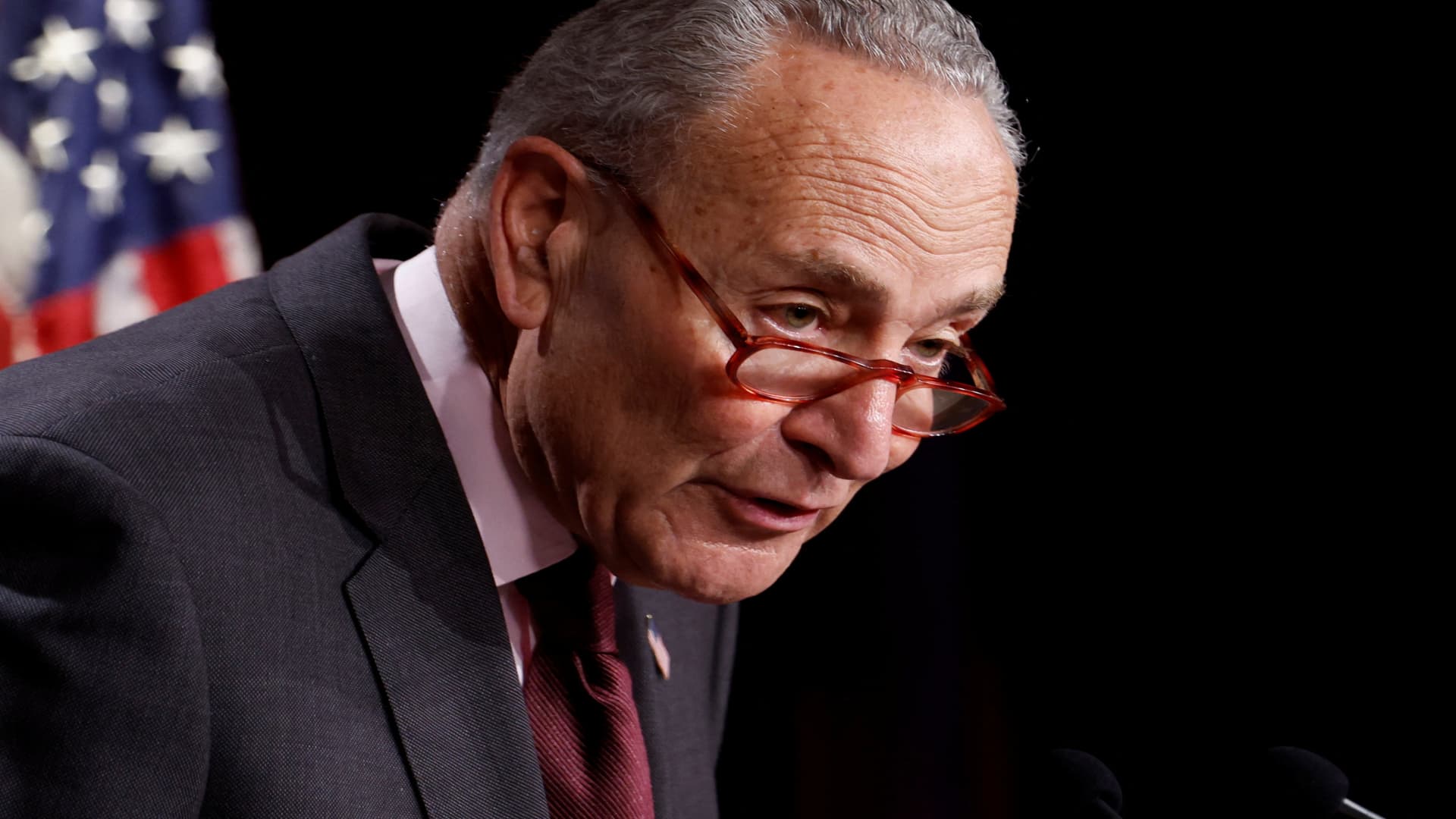
U.S. Senate Majority Leader Chuck Schumer (D-NY) holds a news conference to tout the $430 billion drug pricing, energy and tax bill championed by Democrats at the U.S. Capitol in Washington, U.S. August 5, 2022.
Jonathan Ernst | Reuters
WASHINGTON — Senate Democrats narrowly passed a sweeping climate and economic package on Sunday, putting President Joe Biden and his party on the cusp of a big legislative victory just three months before the crucial November midterm elections.
After a marathon overnight Senate session, the 51-50 vote was strictly along party lines, with all Republicans voting no and all Democrats voting yes. After Vice President Kamala Harris cast the tie-breaking vote, Democrats stood and applauded.
The legislation, dubbed the Inflation Reduction Act, now heads to the House, which plans to return from its summer recess on Friday, pass the legislation and send it to Biden’s desk for his signature.
“It’s been a long, tough and winding road, but at last we have arrived. I know it’s been a long day and a long night. But we’ve gotten it done today,” Senate Majority Leader Chuck Schumer said on the floor before the final vote.
“After more than a year of hard work, the Senate is making history. I am confident the Inflation Reduction Act will endure as one of the defining legislative feats of the 21st century.”
The 755-page bill includes $430 billion to combat climate change and extend health care coverage, paid for with savings on prescription drugs and taxes on corporations. It puts hundreds of billions of dollars toward deficit reduction.
- The bulk of the spending — more than $300 billion — are investments to tackle climate change and boost clean energy, including incentives for farmers and ranchers to reduce methane emissions; an extension of the electric vehicle tax credit; and the launch of a National Climate Bank that would make investments in clean energy technologies and energy efficiency.
- The legislation would empower Medicare to negotiate prices with drug companies for the first time, cutting prescription drug prices for seniors. The savings would help pay for a three-year extension of Affordable Care Act subsidies, which would stave off an expected rise in insurance premiums that were set to go into effect in 2023.
- The package includes a cap on the price of insulin for seniors on Medicare, but Republicans successfully removed a $35 cap on insulin in the private market.
- The bill also raises revenue through a new 15% minimum tax on large corporations, though accelerated depreciation would be exempted — a key ask of centrist Sen. Kyrsten Sinema, D-Ariz., who extracted several tax changes from leadership before getting on board with the package.
- Sinema also successfully killed a provision to close the carried interest tax loophole that benefits private equity and hedge fund managers. It was replaced, with Sinema’s support, by a 1% excise tax on stock buybacks that actually pulls in more revenue than the carried interest provision would have.
The legislation came together quickly. Less than two weeks ago, Senate Majority Leader Chuck Schumer and Sen. Joe Manchin, D-W.V., announced a surprise deal on some of the party’s major agenda items that many Democrats believed had no chance of becoming law this year.
Democrats count the sprawling package as just the latest in an unusual streak of legislative wins for a Congress typically mired in partisan gridlock. There was a $1 trillion infrastructure package last year, the most significant gun reform legislation in a generation, a major semiconductor and science competitiveness package, a bill to help veterans exposed to burn pits and a vote to admit Finland and Sweden into NATO amid a showdown with Russia.
“Mitch McConnell and Republicans have been standing with Big Oil, standing with Big Pharma to protect their profits, and we have been for years trying” to lower costs, Sen. Debbie Stabenow, D-Mich., head of the Democratic Policy Committee, told NBC News.
“This is the big moment here with these forces,” she said, “and the people are going to win.”
Sen. Cory Booker, D-N.J., a progressive and one-time 2020 presidential rival to Biden, also noted Congress’ recent strides.
